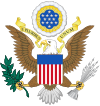This article has multiple issues. Please help improve it or discuss these issues on the talk page. (Learn how and when to remove these template messages)
|
| Reagan era | |||
|---|---|---|---|
| 1980 – see below | |||
 Ronald Reagan (right) and George H. W. Bush, 1982 | |||
| Location | United States | ||
| Including | History of the United States (1980–1991) Post-Cold War Era | ||
| President(s) | Ronald Reagan George H. W. Bush (see below) | ||
| Key events | Reaganomics Iran-Contra Scandal Invasion of Grenada Reagan Doctrine Escalation and end of the Cold War Invasion of Panama Gulf War | ||
Chronology
| |||
| This article is part of a series on the |
| History of the United States |
|---|
 |
| ||
|---|---|---|
|
Personal life 33rd Governor of California
40th President of the United States Legacy |
||
The Reagan era or the Age of Reagan is a periodization of recent American history used by historians and political observers to emphasize that the conservative "Reagan Revolution" led by President Ronald Reagan in domestic and foreign policy had a lasting impact. It overlaps with what political scientists call the Sixth Party System. Definitions of the Reagan era universally include the 1980s, while more extensive definitions may also include the late 1970s, the 1990s, and even the 2000s. In his 2008 book, The Age of Reagan: A History, 1974–2008, historian and journalist Sean Wilentz argues that Reagan dominated this stretch of American history in the same way that Franklin D. Roosevelt and his New Deal legacy dominated the four decades that preceded it.

The Reagan era included ideas and personalities beyond Reagan himself; he is usually characterized as the leader of a broadly-based conservative movement whose ideas dominated national policy-making in areas such as taxes, welfare, defense, the federal judiciary, and the Cold War. Other major conservative figures and organizations of the Reagan era include Jerry Falwell, Phyllis Schlafly, Newt Gingrich, and The Heritage Foundation. The Rehnquist Court, which was inaugurated during Reagan's presidency, handed down several conservative decisions. The Reagan era coincides with the presidency of Reagan, and, in more extensive definitions, the presidencies of Gerald Ford, Jimmy Carter, George H. W. Bush, Bill Clinton, George W. Bush, Barack Obama, Donald Trump, and Joe Biden. Liberals generally lament the Reagan era, while conservatives generally praise it and call for its continuation in the 21st century. Liberals were significantly influenced as well, leading to the Third Way.
Upon taking office, the Reagan administration implemented an economic policy based on the theory of supply-side economics. Taxes were reduced through the passage of the Economic Recovery Tax Act of 1981, while the administration also cut domestic spending and increased military spending. Increasing deficits motivated the passage of tax increases during the George H. W. Bush and Clinton administrations, but taxes were cut again with the passage of the Economic Growth and Tax Relief Reconciliation Act of 2001. During Clinton's presidency, Republicans won passage of the Personal Responsibility and Work Opportunity Act, a bill which placed several new limits on those receiving federal assistance.
Campaigning for the Democratic nomination in 2008, Barack Obama interpreted how Reagan changed the nation's trajectory:
I think Ronald Reagan changed the trajectory of America in a way that Richard Nixon did not and in a way that Bill Clinton did not. He put us on a fundamentally different path because the country was ready for it. I think they felt like with all the excesses of the 1960s and 1970s and government had grown and grown but there wasn't much sense of accountability in terms of how it was operating. I think that people . . . he just tapped into what people were already feeling, which was we want clarity, we want optimism, we want a return to that sense of dynamism and entrepreneurship that had been missing.[1]
© MMXXIII Rich X Search. We shall prevail. All rights reserved. Rich X Search


